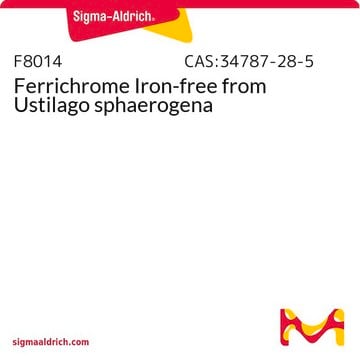D9533
Deferoxamine mesylate salt
≥92.5% (TLC), powder, iron-chelating agent
Synonym(s):
DFX mesylate, DFOM, Deferoxamine methanesulfonate salt, Desferrioxamine mesylate salt
About This Item
Recommended Products
product name
Deferoxamine mesylate salt, powder, ≥92.5% (TLC)
Assay
≥92.5% (TLC)
form
powder
color
white to off-white
solubility
H2O: 50 mg/mL
storage temp.
−20°C
SMILES string
CS(O)(=O)=O.CC(=O)N(O)CCCCCNC(=O)CCC(=O)N(O)CCCCCNC(=O)CCC(=O)N(O)CCCCCN
InChI
1S/C25H48N6O8.CH4O3S/c1-21(32)29(37)18-9-3-6-16-27-22(33)12-14-25(36)31(39)20-10-4-7-17-28-23(34)11-13-24(35)30(38)19-8-2-5-15-26;1-5(2,3)4/h37-39H,2-20,26H2,1H3,(H,27,33)(H,28,34);1H3,(H,2,3,4)
InChI key
IDDIJAWJANBQLJ-UHFFFAOYSA-N
Looking for similar products? Visit Product Comparison Guide
Application
- for cell pretreatment to assess its influenceon cell viability and its interactions with other compounds ()
- to study the effect on Lipocalin 2(Lcn2) production triggered by amyloid-β(Aβ). ()
- used to induce iron starvation in bacterial cultures.()
Biochem/physiol Actions
Storage Class Code
11 - Combustible Solids
WGK
WGK 2
Flash Point(F)
Not applicable
Flash Point(C)
Not applicable
Personal Protective Equipment
Certificates of Analysis (COA)
Search for Certificates of Analysis (COA) by entering the products Lot/Batch Number. Lot and Batch Numbers can be found on a product’s label following the words ‘Lot’ or ‘Batch’.
Already Own This Product?
Find documentation for the products that you have recently purchased in the Document Library.
Customers Also Viewed
Our team of scientists has experience in all areas of research including Life Science, Material Science, Chemical Synthesis, Chromatography, Analytical and many others.
Contact Technical Service













